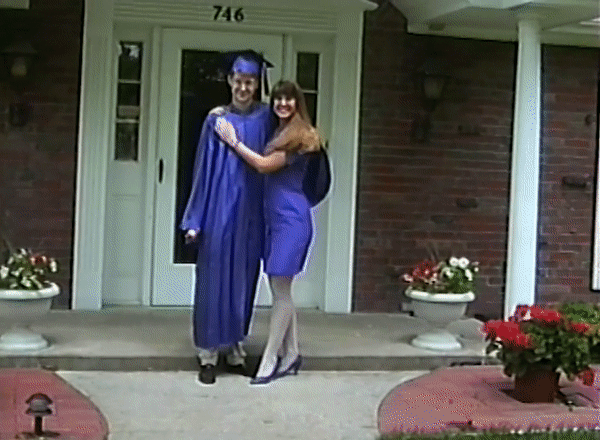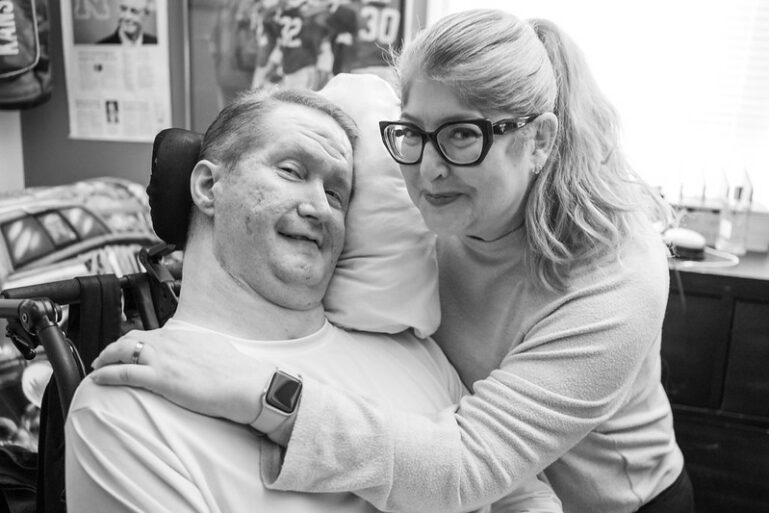The video, dated May 23, 1993, crackles with that unmistakable 90s VHS effect.
The lens of the camcorder pushes into a kitchen. It is morning and relatively quiet save for the program being aired on a small television sitting on the countertop.
Coming into view is Stephen “Deucer” Smith—seated on a barstool, with a bowl of cereal—legs drawn up in front of him on the stool, intently watching the basketball and news highlights from the previous day.
“There’s Deucer,” says his sister Mary from behind the camera. “How he begins graduation day. How are you feeling—you excited?” Deucer turns to look at the camera and nods—mouth full of cereal.
“Are they going to give a diploma, or is it going to be a blank piece of paper?”
“It’ll be a diploma—I’m not too worried about that.”
“Did you bribe your teachers?”
“Nope—passed all my classes.”
“Passed your classes? How’d you manage to do that?”
Deucer smirks. “Because of my superior brain power.”
“Yeah right,” laughs Mary. “They just want to get rid of you.”
As if of a mind to prove his older sister wrong, Deucer stands up and walks over to some shelves in the living room. Adorned in the display case are pictures and accomplishments he made throughout his high school career. Mary zooms in and pans over the collection—a portrait of him in his football gear, an award from the Nebraska Music Educators Association, a Competitive Certificate of Merit from the Nebraska High School Mock Trial Project. And in the middle of the display—an orange letter “S”—denoting the wealth of athletic, musical, and academic letters Deucer earned in his four years at Seward High School, in Seward, Nebraska.
Later that day, the camera captures the moments leading up to the trip to the ceremony. Deucer takes pictures with Mary and their parents Susan and Stephen in front of the house where the two siblings spent their whole lives. After pictures, he hops in his silver Camaro. The car is Deucer’s pride and joy—paid for with his own money earned from many summers’ arduous work of detasseling corn. He revs the engine and backs out of the driveway.
He honks the horn and drives off, a soon-to-be high school graduate.
For many, videos and pictures from a high school graduation are a fun dose of nostalgia—a simple view into the past when things seemed simpler and freer. But for Deucer, Mary, and their friends and family, these videos would be the last time Deucer’s voice was captured on film.
…
It is February 2023.
The two siblings are in Deucer’s room in QLI’s Summit, a skilled-level care for adults with neurological illnesses or injuries. Adorning the walls are items that are equal measures memorabilia from Deucer’s past—football jerseys, photos, school golf bags— and Nebraska gear—red flags with the big white “N” and newspaper clippings reminiscing of the glory years under Tom Osborne’s co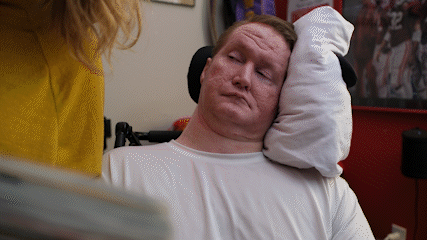
Mary arrived in town a few days ago and has brought an album. On its cover is a typed and bold “Deucer’s Story.” It is a massive collection, filled with photos, school papers, and projects—all chronicling the life of Deucer from birth through his high school graduation. Mary pulls up a chair and sits beside Deucer in his powered wheelchair and begins reminiscing about their younger years.
“Has anyone read this to you for the longest time?” Mary has opened the album with a section titled “My Life Story,” written from the perspective of a fifth-grade Deucer. As Mary narrates the life experiences of ten-year-old Deucer to the forty-eight-year-old Deucer, his eyes twinkle. He grins and shakes with laughter when remembering vacations to Florida and ding-dong ditching with his friends. At the close of the section is a school assignment—a filled-out personal crest. At the end of a list titled “Thing I Want to Be Remembered For,” it says “I want to be remembered for being tough.” Mary looks over to Deucer in his chair. “Yeah,” she smiles and pats his arm, “you’re pretty tough.” She notices that he is looking up and to the right—there’s something he needs.
“Would you like to spell?” Mary asks. Deucer holds his gaze and doesn’t blink—that’s a “no.”
“Is it something on a list?” she asks. Deucer blinks—a “yes.”
“Okay—go,” prompts Mary. Deucer begins to blink, with Mary audibly confirming the number with each blink.
There are eighteen lists filled with requests from Deucer, lists that have been expanding for nearly 30 years. This time his request is on List #18, and eight prompts down that list.
“Place left ring finger over left middle finger,” Mary confirms that this is what he is looking for and does so.
“He gets cramps in his fingers,” she says. “Doing this helps to alleviate some of that pain.”
…
It is August 1993.
Deucer has just arrived in Salina, Kansas—about a week out from starting his freshman year of college at Kansas Wesleyan University. Aided by golf and music scholarships, he is considering a pre-law or pre-medicine path.
He and his friends stop by a Blockbuster Video store. They can’t rent a movie—their store card doesn’t work in Kansas. It is early, early morning—around 1 a.m. They instead decide to drive around town, eventually seeing a group of young women around their age. They stop to talk to them, making light conversation. Across the street is a group of local teenagers who didn’t take kindly to the “outsider” crowd coming into Salina to attend college. The teenagers from across the street converge on Deucer and his friends, shoving and pushing them. One of the group from across the street blindsides Deucer with a hard punch to the head. Deucer goes down, his jaw shattered from the punch, and his head struck the ground. Amazingly, he gets back up and staggers, but collapses once more—this time for good.
…
Deucer suffered a significant traumatic brain injury. Because of the punch, one of his meningeal arteries burst, compacting his brain near the brain stem and creating a slow brain bleed.
“In a sense, we were lucky the assault happened right outside a firehouse, where paramedics saw 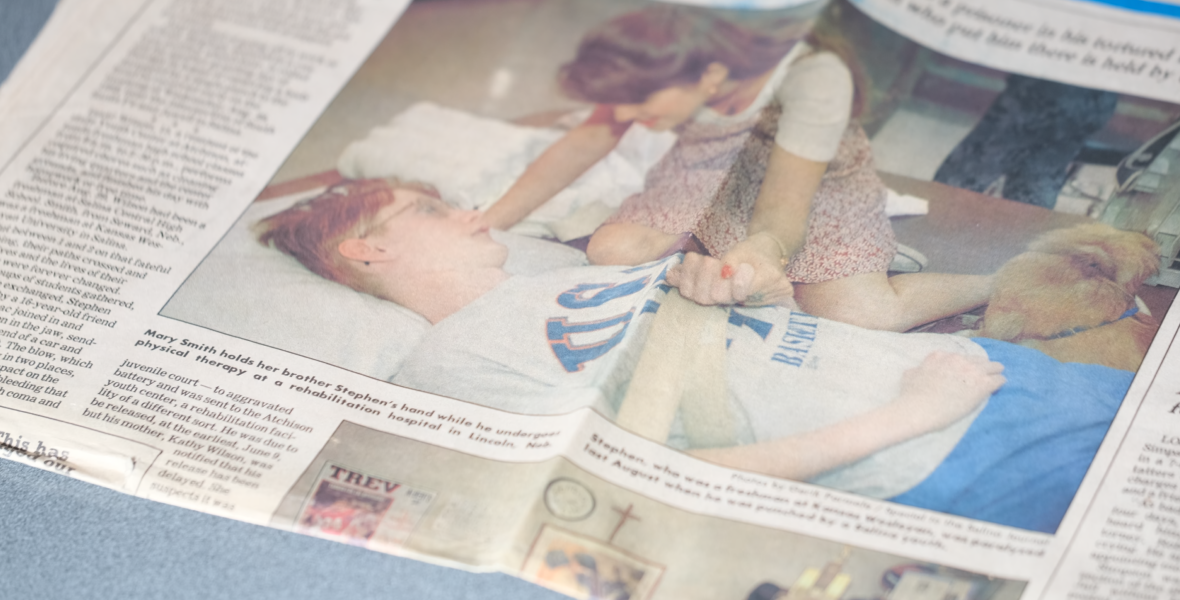
Deucer did wake up but was only able to move his eyes—a term often referred to as “locked-in syndrome.”
“When he was at Immanuel Hospital in Omaha, I came to visit him,” says Mary. “I had a shirt on that had a lot of words on it, and I noticed the gaze in his eyes. He was reading the shirt and then would catch my eyes. I grabbed two pieces of paper, writing ‘yes’ and ‘no’ on them. I stood beside his hospital bed, held out both papers and asked Deucer, ‘Do you know who I am?’ Deucer looked at the paper marked ‘yes’—I knew then that Deucer was still with us.”
With this knowledge, Deucer and his family/therapists set out to develop a simple, yet intricate communication system. The system is twofold: the first is comprised of commonly used requests (“Please tilt my chair back”) and phrases (“How are you today?”). The second is a spelling/letter chart for novel words and phrases. Each list (numbered 1-18) is accompanied by further listed items. These items might be something like the aforementioned placing of the middle finger over the index finger, while others may request a team member to tilt his chair or ask how their day is going. The spelling chart offers greater depth with every letter of the alphabet grouped in five rows of letters—going row by row, and then over letter by letter is the tool that allows Deucer to fully express a thought.
When Deucer wishes to communicate with someone, he first looks up and to the right, indicating that he needs something. The other person will ask Deucer “Is it on a list?” If Deucer does not blink after this question, they will ask “Do you want to spell?” Either blink will lead to the correct path. If it’s a list, the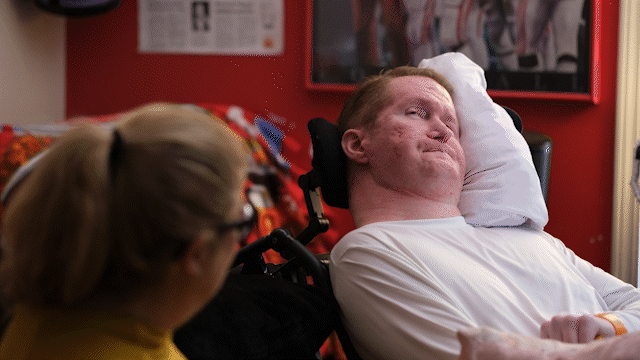
Deucer was first admitted to the rehabilitation campus in 1999. “The culture of QLI was immediately palpable,” says Mary. “We had a plan—and the team was in our corner to help us execute the plan. After completing his rehabilitation program, Deucer opted to transition to QLI’s Summit, now over twenty years ago. He has significantly impacted many team members in that time with his wit, humor, and zeal for life. “When I think back on the team at QLI, I’m always struck by the absolute willingness to be there for Deucer, whatever the circumstances.”
“It takes some time to communicate with Deucer,” says Campus Leader Kinyarie Dethloff. “But the time spent is immensely worth it. The questions on his lists aren’t just regarding his cares—there are also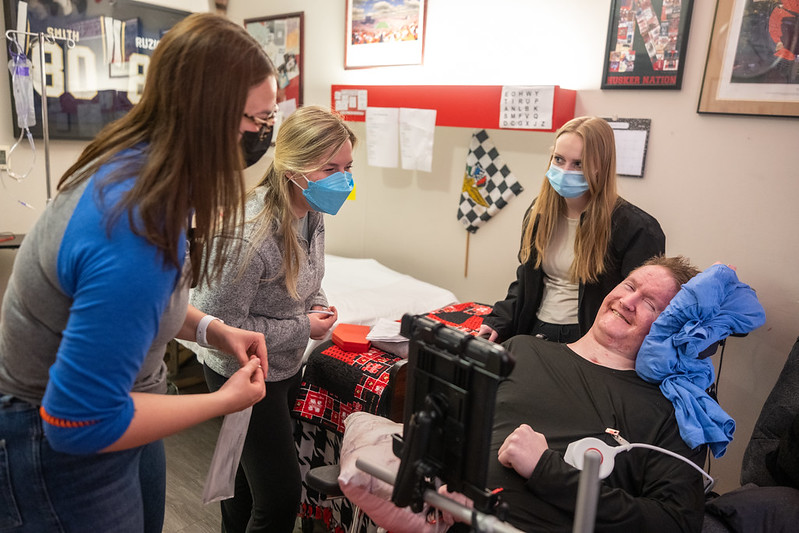
“Out of the blue one day, I received a text from him. It was like I heard his voice for the first time in nearly thirty years,” says Mary. “The joy that it brought to both of us is almost indescribable.”
…
“People may think Deucer has lost so much,” says Mary, “but that’s not the case. He has so much to give.” Three decades have shown that Deucer gives a profound perspective on life. Many years ago, Mary took Deucer to a local basketball game. After finding a great spot courtside, a couple of young children stood in front of them—eager to see all the action up close.
“I was initially a little annoyed,” says Mary. “They were standing right in front of Deucer, and he wasn’t able to see around them.” But after Mary asked the children to move out of Deucer’s way, he indicated that he wanted to spell.
“Let them in front of me,” Deucer said with a smile, understanding the importance of fun, childhood memories.
…
Even when considering the assault that forever changed his life, Deucer has helped both himself and his sister be at peace with what happened and move on. For years, as Mary recalled, “I wanted them to know what they did to my brother. I wanted them to feel sorry for it.”
But now, she views things differently. A few years ago, as they were both discussing the assault, Deucer noted to Mary how he felt, looking back.
“I forgive them,” Deucer told Mary. “People do stupid things when they’re young.” Mary has since grown to forgive them as well.
That day in August nearly thirty years ago changed their lives, but that bond they shared growing up just grew stronger.
Deucer Smith and Mary Coons move forward together, perpetually.
The pains of the past are never things to dwell on.
The course of their lives is what they make of it.
Categories: Client Story

